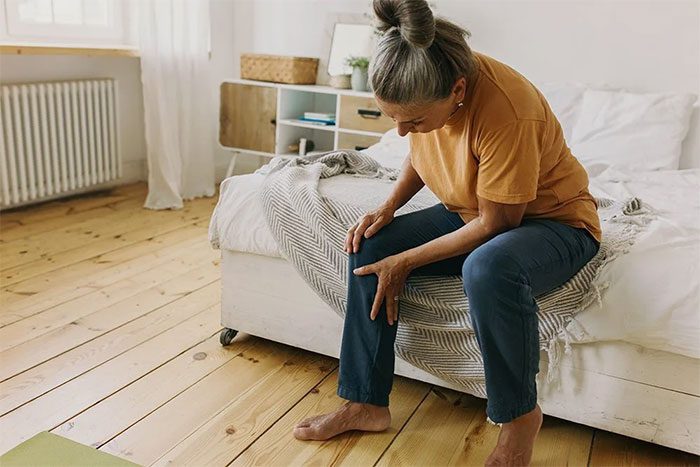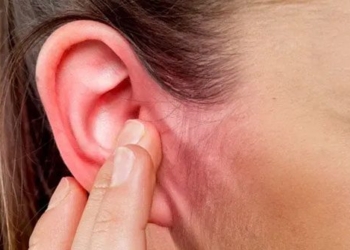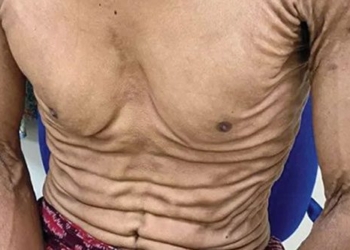Waking up with a feeling of joint stiffness and pain in the morning can often be attributed to age, an inadequate mattress, or poor sleep quality. However, behind that feeling of stiffness and joint pain may lie a more serious condition than you think, especially if this occurs frequently.
What is Morning Joint Stiffness?
Below is information about the causes of morning joint stiffness and how to cope with this condition that you may find helpful.
1. Causes of Morning Joint Stiffness
There are many reasons for morning joint stiffness, here are some common causes:
1.1. Non-inflammatory Gel Phenomenon
Your joints have a natural lubricant called synovial fluid, which is a super filtrate of plasma and contains proteins derived from plasma and proteins produced by cells in the joint tissues.
This viscous fluid fills the gaps between the bones, allowing for smooth movements in the knees, elbows, and other joints. The more you move, the more this fluid circulates in your joints, keeping everything moving smoothly.
However, when you lie down for an extended period, this circulation reduces, leading to what is known as “morning gel” — a thickened synovial fluid that makes you feel stiffer in the morning. Fortunately, this stiffness will gradually diminish and disappear as you move and become active again.

Morning joint stiffness is a common phenomenon. (Photo: Internet).
1.2. Arthritis
Morning stiffness can also occur in individuals with arthritis, such as rheumatoid arthritis, psoriatic arthritis, ankylosing spondylitis, or osteoarthritis. Depending on the type of arthritis you have, accompanying symptoms will differ, for example:
- In rheumatoid arthritis, morning stiffness may last over an hour or up to several hours.
- In psoriatic arthritis patients, morning stiffness and pain are often more severe, lasting more than 30 minutes.
- In osteoarthritis or another non-inflammatory musculoskeletal condition, morning stiffness typically resolves within half an hour or less after waking up.
- Morning stiffness is the most common symptom of ankylosing spondylitis, primarily affecting the spine, hips, and knees. Sleeping for an extended period, such as over 8 hours, may worsen the stiffness.
1.3. Low Cortisol Levels
Some researchers suggest that morning stiffness may be related to hormonal fluctuations in the body over a 24-hour cycle. It is believed that certain conditions lead to low levels of the hormone cortisol at night. Low cortisol overnight prevents your body from inhibiting inflammatory cells known as cytokines, such as interleukin-6.
Increased inflammation contributes to symptoms of arthritis like morning pain and stiffness, especially for those with arthritis. Your cortisol level tends to be highest (peaking) in the morning. As the day progresses, levels and inflammation decrease, and your arthritis symptoms may gradually improve.
In addition to the aforementioned conditions that can cause morning stiffness, according to WebMD, several factors that might cause you to wake up with this discomfort include aging, thyroid disease, vitamin D deficiency, fibromyalgia, and obesity.
2. Dealing with Morning Joint Stiffness
You can manage morning joint stiffness with medications, changes in daily habits, or lifestyle modifications.
2.1. Medications
Medications can alleviate symptoms of rheumatoid arthritis, such as morning stiffness. Non-steroidal anti-inflammatory drugs (NSAIDs) like ibuprofen or naproxen are available over the counter to treat pain and inflammation.
Topical medications can also be effective for morning joint stiffness. These include capsaicin from chili peppers and substances like menthol or camphor that create a cooling or warming sensation on your skin. Other topical medications include salicylates, which contain pain-relieving properties similar to aspirin, and topical anesthetics like lidocaine.
Some stronger topical medications, such as NSAIDs, require a prescription from a doctor.
Apply creams or gels to the skin around stiff joints such as the hands, fingers, or knees. You may need to use certain topical medications multiple times a day or for several weeks to feel relief.

Medications can help reduce joint stiffness pain. (Photo: Internet).
You can also manage morning stiffness due to arthritis by:
- Using knee braces or splints while sleeping
- Keeping warm with electric blankets, heating pads, or increasing room temperature, especially during cold seasons
- Doing stretching exercises to relax your body before getting out of bed
- Taking a hot shower in the morning can help relax joints and muscles
- Reducing stress before bedtime.
2.2. Lifestyle Changes
A few lifestyle and activity changes can also help reduce morning joint stiffness, specifically:
- Engaging in gentle exercises with daily joint stretching can help loosen stiff joints and improve your range of motion. Activities like walking, cycling, or swimming are recommended, or tai chi can enhance your joint flexibility.
- Managing stress through deep breathing techniques, yoga, or meditation can be beneficial for alleviating morning stiffness caused by stress.
- A healthy, balanced diet rich in fruits and vegetables, while reducing fats from fried foods and animal fats, is essential. Additionally, increasing the intake of omega-3 fatty acids and antioxidants has been shown to reduce inflammation in the body.
- Getting enough sleep also helps improve your perception of pain.
2.3. Heat Therapy
Heat therapy methods can help improve blood circulation to stiff joints, including:
- Taking a hot bath or soaking in warm water
- Applying heat pads or warm compresses to the stiff areas.
2.4. Consulting a Doctor
One of the key strategies for managing morning joint stiffness is to pay attention to the severity of the pain, its frequency, and any unusual accompanying symptoms. If morning stiffness occurs regularly, especially lasting more than three consecutive days, promptly consult a doctor for appropriate advice.
Your doctor may examine your joints, order blood tests, or joint fluid tests to check for inflammation. The results will help determine the cause of your morning stiffness and assist your doctor in finding a suitable treatment for you.





















































